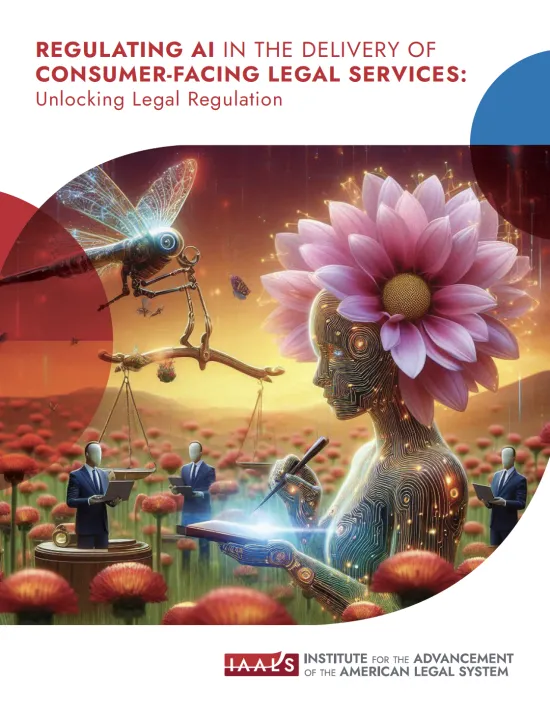Unlocking Legal Regulation
Project Status: Evaluating Utah; Advising on AI; Building Momentum

Regulating the use of AI
IAALS is actively working on issues related to regulating the use of Artificial Intelligence (AI) in the delivery of consumer-facing legal services, and we have collected these resources for legal professionals interested in learning more. We do not include resources for legal professionals who are looking to learn more about how lawyers can use AI tools to do work.
This page is updated as additional information and resources are identified. Have a resource to share? Please contact Ericka Byram, Program Associate, at ericka.byram@du.edu.
- A Simple Law That Would Unshackle AI for Legal Use by Lucian T. Pera (2025)
- A2J Lab Project in Development: AI Assistance in Provision of Legal Information & Advice by D. James Greiner, Michelle Blouin, & Eric Krebs (2025)
- New Governance and New Technologies: Creating a Regulatory Regime for the Use of Generative Artificial Intelligence in the Courts by Raymond H. Brescia (2024)
- Certifying Legal AI Assistants for Unrepresented Litigants: A Global Survey of Access to Civil Justice, Unauthorized Practice of Law, and AI by Mia Bonardi (2024)
- Re-Regulating UPL in an Age of AI by Ed Walters (2024)
- Good AI Legal Help, Bad AI Legal Help: Establishing quality standards for responses to people’s legal problem stories by Margaret D. Hagan (2024)
- Gray Advice by Keith Porcaro (2024)
- Auto Clubs and the Lost Origins of the Access-to-Justice Crisis by Nora Freeman Engstrom and James Stone (2024)
- Toward National Regulation of Legal Technology: A Path Forward for Access to Justice by Drew Simshaw (2023)
- Towards Human-Centered Standards for Legal Help AI by Margaret D. Hagan (2023)
- The Use and Application of Generative AI for Legal Assistance by Margaret D. Hagan (2023)
- From Founded to Funded: Challenges & Visions for Justice Tech by Kelli M. Raker (2023)
- Access to A.I. Justice: Avoiding an Inequitable Two-Tiered System of Legal Services by Drew Simshaw (2022)
- The Middle Ground: A Meaningful Balance Between the Benefits and Limitations of Artificial Intelligence to Assist with the Justice Gap by Katherine L. W. Norton (2020)
- ChatGPT, Esq.: Recasting Unauthorized Practice of Law in the Era of Generative AI by Joseph J. Avery, Patricia Sánchez Abril, Alissa del Riego (2023)
- Online Legal Document Providers and the Public Interest: Using a Certification Approach to Balance Access to Justice and Public Perception by Susan Saab Fortney (2019)
- The Future of American Legal Tech: Regulation, Culture, Markets (Part I, Chapter 1, Legal Tech and the Future of Civil Justice) by Benjamin Barton (2023)
- The Supply and Demand of Legal Help on the Internet (Part III, Chapter 9, Legal Tech and the Future of Civil Justice) by Margaret Hagan (2023)
- Audit report for Legal Information Assistant (LIA), Prepared for Legal Aid of North Carolina (2025)
- Colorado's Non-Prosecution Policy Regarding the Unauthorized Practice of Law by Nonlawyers
- National Institute for Standards and Technology (NIST) Risk Management Framework
- Colorado’s Consumer Protection for Artificial Intelligence Act
- Ontario’s AI Human Rights Impact Assessment
- International Council for Online Dispute Resolution’s Ethical Standards
- The Fairly Trained certification
- JusticeBench: An R&D Community Platform for AI and Access to Justice
- Utah Supreme Court Ad Hoc Committees on Regulatory Reform: Working Group and draft Committee Summaries and Recommendations
- RAILS—Responsible AI in Legal Services—hosted by the Duke Center on Law and Tech
- American Bar Association’s Task Force on Law and Artificial Intelligence
- Minnesota State Bar Association Artificial Intelligence Committee Report to the Minnesota Supreme Court on a Proposed AI Sandbox and Access to Justice Initiative
- The Washington Supreme Court Practice of Law Board and Washington State Bar Association’s Pilot Test of Entity Regulation
- Ontario’s Access to Innovation Project
- TRI/NCSC AI Policy Consortium for Law & Courts initiative and white paper
- Legal Innovation & Technology Lab at Suffolk University Law School
- Deborah L. Rhode on the Legal Profession at Stanford Law School
- Stanford Legal Design Lab
- Innovation for Justice at the University of Arizona Law School and University of Utah Business School
- AI Law Lab at Vanderbilt Law School
- Center for Access to Justice and Technology at Chicago-Kent College of Law
- Law & Innovation Lab at the University of Denver Sturm College of Law
- Justice Technology Association
